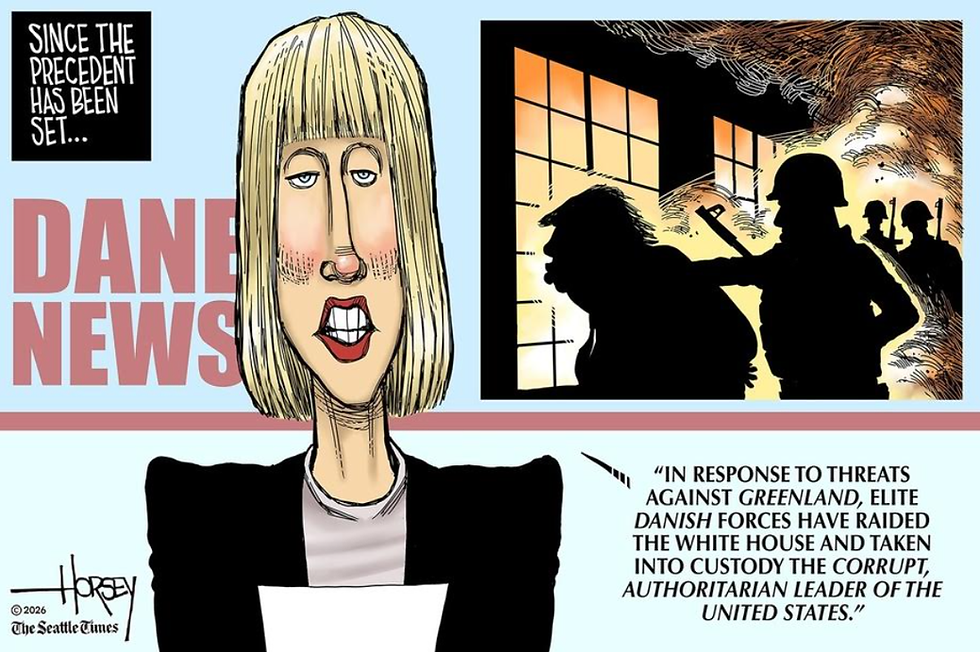Republicans Shouldn’t Switch Parties Unless They’re Ready To Switch Values And Priorities
- Howie Klein

- Aug 6, 2025
- 5 min read
Loving Your Neighbor Is A Good Start For Geoff Duncan— But Not A Pass

When a Republican politician switches to the Democratic Party I always wonder is because of them or because of their constituents. My instinct is not not trust that they’re switching ingot faith, that they want to bring their conservative agenda and values to the Democratic Party— which has too many politicians with conservative values and agendas already. But then I remind myself: Elizabeth Warren was once a Republican too. So they’re not all just a bunch of Reagan conservatives mortified by Trump. I mean every normal person, liberal, conservative or not sure, is mortified by Trump but is that enough to embrace a fence jumper, especially one who switches parties and announces their candidacy for office the next day?
Yesterday former Georgia Lt. Governor and former Republican, Geoff Duncan wrote an OpEd in the Atlanta Journal-Constitution, From Republican Lt. Governor To Democrat: Loving My Neighbor Is Easier Now. He wrote that his journey to switch parties “started well before Donald Trump tried to steal the 2020 election in Georgia. There’s no date on a calendar or line in the sand that points to the exact moment in time my political heart changed, but it has.”
He wrote that his decision to leave the GOP “was centered around my daily struggle to love my neighbor, as a Republican. Throughout the course of time one of the most recognizable moral standards that communities around the world hold themselves accountable to is ‘love my neighbor.’ … There will never be a shortage of people or places to exercise the time-tested approach of loving your neighbor, regardless of race, religion, lifestyle or immigration status.”
My time in elected office has taught me the most effective way to love your neighbor on a mass scale is through prudent public policy. Authoring the now $75 million rural hospital tax credit as a state representative and then later partnering with Democrats as lieutenant governor to successfully pass hate crimes legislation has helped give me that rewarding perspective.
There’s more work to be done in pursuit of loving our neighbors here in Georgia.
Many are surprised to learn that 1,219,600 or 11.4% of Georgians wake up every day without health insurance for a multitude of complicated reasons. These uninsured Georgians face an impossible decision every time they or their family get sick.
Go to the hospital as an uninsured patient and get financially destroyed or deal with the health implications of not going to the hospital.
Republicans have argued for decades the fix to this scenario is simple: a job. As the famous radio personality Paul Harvey used to say, now for the rest of the story.
According to the Kaiser Family Foundation approximately 85% of uninsured Georgians live in working households but remain uninsured due to issues with affordability or eligibility. So, the reality is they have a job, just the wrong job. One that doesn’t offer health insurance or generate enough spare money each month to afford their own health insurance plan.
Making matters worse, an estimated 500,000 of those same neighbors wake up every day with a huge asterisk over their heads, commonly referred to as the Medicaid coverage gap. In other words, they make too much money to qualify for traditional Medicaid or ACA subsidies, but not enough to afford buying it on their own. Talk about being between a rock and a hard place!
Medicaid funding is now in shambles because of the not so “big beautiful bill” with budget cuts totaling $911 billion over the next 10 years. Any state-led expansion of Medicaid now will be complicated and expensive given the current dynamics. Nobody ever said loving your neighbor was going to be easy or cheap, just worth it.
The tragic effects of poverty come in all kinds of shapes and sizes, some more heartbreaking than others. An estimated 19.6% of children (500,000) in Georgia lack consistent access to food. There must be no heavier weight on a child’s shoulders than walking into school hungry day after day.
Further troubling is the brutal reality of the recent $200 billion budget cuts to SNAP and the program’s effectiveness to continue to help feed hungry kids at school through free and reduced cost meals. We should all be looking for ways to love these kids better than continuing to send them to school hungry under the guise of an income tax break, even if the solution has to be financed out of our state’s abundantly funded $17 billion rainy-day fund.
Sometimes loving your neighbor doesn’t cost money, it just requires us to make better decisions.
According to a Quinnipiac poll, 92% of our neighbors across the country want universal background checks and 83% support red flag laws in place before someone buys a gun. Additionally, 74% want to raise the legal age limit to purchase a gun to 21. Sounds like the best way to love our neighbors in this instance is to pass meaningful gun legislation in Georgia that does more than nibble around the edges of a national crisis.
Recent immigration policies have turned into a lesson on how not to love your neighbor. Ordering military style raids on undocumented but law-abiding families for the sole purpose of creating a feeding frenzy on social media is the epitome of heartless, not to mention pointless. For anyone willing to look through a nonpartisan lens, the solution to our immigration woes is simple: Secure the border, identify and deport undocumented immigrants guilty of a felony and offer a pathway to citizenship to everyone else. Problem solved.
The list of reasons why I’m now a Democrat continues to grow. Most importantly, my decision puts me in the best possible position each day to love my neighbor.
The OpEd is earnest, well-crafted, and appeals to the kind of politics many wish still existed in the Republican Party if it ever truly did. His shift may be heartfelt, and the policies he’s pushing for now— expanding Medicaid, fighting childhood hunger, enacting gun reform— are genuinely urgent and necessary. But let’s be clear: none of these policies were born in a vacuum. They were blocked and sabotaged by the very party he spent years helping to lead. His newfound compassion may be real, but it’s arriving after a long stretch of complicity.
And yet, isn’t this exactly what we say we want? For people to change? For former Republicans to reckon with what their party has become— and more importantly, what it always was beneath the surface? If we shut the door on them the moment they cross over, who are we building a coalition with? At the same time, welcoming former Republicans shouldn’t mean diluting Democratic values or shifting the party further right to accommodate them. The bar for redemption should be high, but not unreachable.
Geoff Duncan still has plenty to prove. His critique of Trumpism is welcome. His newfound interest in equity, healthcare and hunger relief is welcome. But if he’s serious about being a Democrat, then he needs to show he’s ready not just to “love his neighbor,” but to fight, with real urgency, for a government that delivers justice, dignity and opportunity to every single one of them.
I doubt any regular DWT readers will confuse a heartfelt op-ed with a progressive record. There are more than enough conservative ex-Republicans in the Democratic Party now. What the party needs is a spine and a soul big enough to take in the repentant only if they spend the time learning what it means to be a Democrat before they run for office. One of the middle-of-the road guys running against Mark Pinsley for the Lehigh Valley congressional seat, Ryan Crosswell, re-registered as a Democrat just before announcing his candidacy— and in a district he doesn’t live in. Conveniently, his campaign website doesn’t even have a policy page.







Comments